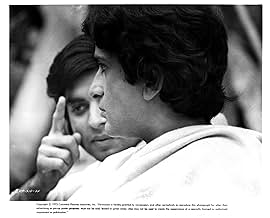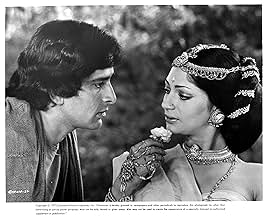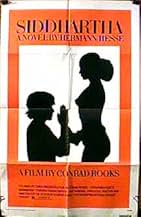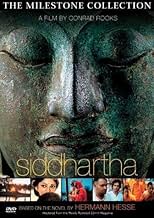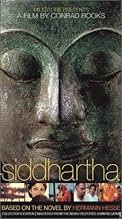AVALIAÇÃO DA IMDb
6,6/10
1,3 mil
SUA AVALIAÇÃO
Adicionar um enredo no seu idiomaThe story of a young Indian who embarks upon a journey to find the meaning of existence. Based on the novel by Hermann Hesse.The story of a young Indian who embarks upon a journey to find the meaning of existence. Based on the novel by Hermann Hesse.The story of a young Indian who embarks upon a journey to find the meaning of existence. Based on the novel by Hermann Hesse.
- Direção
- Roteiristas
- Artistas
Avaliações em destaque
This is much smoother but less interesting than Conrad Rooks' other earlier and more cultish film, his drug autobiography `Chappaqua' (1966), which has cameos by Allen Ginzburg, William Burroughs, and jazzman Ornette Coleman in it. The trouble is `Siddhartha,' beautiful as it is, is a simplification of a simplification, and a spiritual quest isn't something you necessarily understand better through lush visuals, though unquestionably some of Sven Nykvist's watery landscapes with trees are unforgettable, the color is deep and rich, the music is pleasing, and the principals are awfully good looking people. Not surprisingly the high point cinematically is the sequence showing erotic encounters between the handsome lapsed sadhu, Siddhartha (Shashi Kapoor), and the lovely courtesan, Kamala. Simi Garewal, who plays Kamala, is a gorgeous creature whose lovely eyes, long aristocratic nose, and pouty lips remind one of the all-time arch teaser and sexy sophisticate of English films, Joan Greenwood. But Ms. Greenwood never was got up in the kind of exquisite gilded see-through gear Simi wears in her scenes with Shashi Kapoor. She's something to look at.
When his buddy Govinda decides earlier to follow the Buddha, Siddhartha leaves Govinda bereft by deciding to go off on his own lone search, without a guru. It seems that the point is you must pursue your quest on your own. But Siddhartha's splitting with Govinda seems somewhat meaningless since at the end of the movie, Siddhartha has joined up with the peaceful boatman he met years earlier toward the end of his sadhu period, and he winds up spouting the boatman's words of wisdom: live in the present, stop seeking, don't worry, be happy, and watch the river. The Buddha apparently hasn't helped Govinda all that much either, since he meets Siddhartha again and also needs to be taught the boatman's simple doctrines. One can't help thinking they'd both have done better staying with the Buddha, who did, after all, found one of the world's great religions.
It's rather amusing that during the two men's youthful sadhu period, when they're on the road with a group of penniless holy men, `meditation' is represented as singing rhythmically and passing a bong. My picture of this activity was different, but `Chappaqua' shows how obsessed with and involved in drugs Conrad Rooks was.
This is a lovely, but empty and ultimately not very cinematic film. Sven Nykvist's photography is at the service of a vision so generalized (Siddhartha is a universal type, not an individual), that too often the images look like something out of `National Geographic' with mise-en-scène by Bollywood. The scenes are not as exotic as those Pasolini created for his `Arabian Nights' (1974), nor are Rooks' depictions of Indian rural life ever remotely as real as Satyajit Ray's in the `Apu Trilogy.' For a trippier film version of Hermann Hesse, see Fred Haines' `Steppenwolf,' which came two years after `Siddhartha,' in 1974. For a more original film depiction of a spiritual quest, see the story of G.I. Gurdjieff as done by Peter Brooks in `Meetings with Remarkable men' (1979).
When his buddy Govinda decides earlier to follow the Buddha, Siddhartha leaves Govinda bereft by deciding to go off on his own lone search, without a guru. It seems that the point is you must pursue your quest on your own. But Siddhartha's splitting with Govinda seems somewhat meaningless since at the end of the movie, Siddhartha has joined up with the peaceful boatman he met years earlier toward the end of his sadhu period, and he winds up spouting the boatman's words of wisdom: live in the present, stop seeking, don't worry, be happy, and watch the river. The Buddha apparently hasn't helped Govinda all that much either, since he meets Siddhartha again and also needs to be taught the boatman's simple doctrines. One can't help thinking they'd both have done better staying with the Buddha, who did, after all, found one of the world's great religions.
It's rather amusing that during the two men's youthful sadhu period, when they're on the road with a group of penniless holy men, `meditation' is represented as singing rhythmically and passing a bong. My picture of this activity was different, but `Chappaqua' shows how obsessed with and involved in drugs Conrad Rooks was.
This is a lovely, but empty and ultimately not very cinematic film. Sven Nykvist's photography is at the service of a vision so generalized (Siddhartha is a universal type, not an individual), that too often the images look like something out of `National Geographic' with mise-en-scène by Bollywood. The scenes are not as exotic as those Pasolini created for his `Arabian Nights' (1974), nor are Rooks' depictions of Indian rural life ever remotely as real as Satyajit Ray's in the `Apu Trilogy.' For a trippier film version of Hermann Hesse, see Fred Haines' `Steppenwolf,' which came two years after `Siddhartha,' in 1974. For a more original film depiction of a spiritual quest, see the story of G.I. Gurdjieff as done by Peter Brooks in `Meetings with Remarkable men' (1979).
If you loved the book by Hermann Hesse, you will most likely love this film. At times, it seems rather disjointed - almost as though I had blinked and missed a scene. I really consider this film to be a great companion to a great book. I am curious to know what people who had not read the book would think of this film.
10movinut
I saw the movie twice, the first time in Sweden in 1974; I had read Herman Hesse's book before that, and the story had strongly impressed me. The movie was even better then the book! the photography was very poetic, the music (indian flutes, tablas) was very high in the aesthetics band, and the story conformed more or less with the book, but without taking away any of it's impact. there were 12 people in the theatre, and at the end as the credits were scrolling for what seemed at least 20 minutes, no-one moved from their seats as transfixed by what they had just seen. I am sure that all 12 of those people recall to this day the effect that this film created on them. I am not a Buddhist or even very religious, but i personally recommend it as part of a person's education in life....
It would be easier to write the following comment if the copyright owners, made the film accessible to individual consumers...I`m trying to remember the thematics of this film!! I saw this film 2 years ago on the big screen. This film is far from being about a pointless quest, those are words of a mind that has lost the way , the way to self knowledge, through such questions as: "who am i?"" where did i come from?", and "where am i going?". These might seem irrelevant to the impatient mind but given ample time, the relevancy to all people will become very apparent. What this film conveys is one man`s journey on such a path of "self"knowledge. An indepth appreciation of indian thought or , philosophy or likewise may prove invaluable in terms of understanding , some of the seemingly fleeting or trivial scenes, or more culturally esoteric moments in the film, thus,enabling one to be more fully consummated by its story, however I am sure it is not a prerequisite for the artfully minded!. Among the the features of this film, is the music, of a musician singer who is legendary in India(I cant remember his name right now!)and is certainly legendary in this film, and is certainly a beautiful record of the 'Indian' spirituality alive and breathing to this day in India. If anyone can tell me where i can get the soundtrack or some compilation of the music in this film i would be very appreciative, (this request is a long standing one)
This film would appeal to those people who see or find or sense themselves on a similar"path" or quest, and may give much confirmation or food for thought about the possible turning points, or unknown or unexpected "detours" that one finds themselves engaged in along the way. This film offers a message, a very sound message about the quest of the human spirit its struggle for higher fulfillment, which i add Is the quest of the human being.
This film would appeal to those people who see or find or sense themselves on a similar"path" or quest, and may give much confirmation or food for thought about the possible turning points, or unknown or unexpected "detours" that one finds themselves engaged in along the way. This film offers a message, a very sound message about the quest of the human spirit its struggle for higher fulfillment, which i add Is the quest of the human being.
10pinoj18
I saw the movie Siddhartha some time ago because when I first saw the title, I recognized it as a philosophical work from my college days when I study Hesse's work from my philosophy class.
It is a great film: I enjoyed it as much as I enjoyed the book by Hermann Hesse. As a philosophy major, the philosophical underlinings in the movie are most appropriate. It is by all accounts, a true Hesse's commentary on the meaning of life and man's condition on earth.
I especially liked the music although the lyrics were foreign to me. I wish I could get a translation of the songs that made the film even more enjoyable.
A great philosophical work of art.
It is a great film: I enjoyed it as much as I enjoyed the book by Hermann Hesse. As a philosophy major, the philosophical underlinings in the movie are most appropriate. It is by all accounts, a true Hesse's commentary on the meaning of life and man's condition on earth.
I especially liked the music although the lyrics were foreign to me. I wish I could get a translation of the songs that made the film even more enjoyable.
A great philosophical work of art.
Você sabia?
- CuriosidadesSimi Garewal took the boldest step in her career by going topless for a scene in this film. It was the first topless scene in the history of Bollywood and created a massive uproar. When the scene was featured on the cover of two English magazines, it created more controversy and ended up in court. The film eventually got banned in India. When asked about it years later, Garewal, who said she was never shy, revealed that she would have stripped totally naked if they had let her. In fact, she had been totally nude in front of the filming crew for Mera Naam Joker the same year, but they only showed her from the back onscreen. She said she loved the freedom of losing her inhibitions and her clothes.
- Citações
Siddhartha: I have come to say, that you are all the things that will outlive me, that you, Kamala, will be all the beauty that will be in the shadow we leave. You will be my first love, my only love.
- ConexõesReferenced in Thirtysomething: Melissa and Men (1991)
- Trilhas sonorasMother's Song
by Shanti Hiranand
Principais escolhas
Faça login para avaliar e ver a lista de recomendações personalizadas
- How long is Siddhartha?Fornecido pela Alexa
Detalhes
- Data de lançamento
- Países de origem
- Centrais de atendimento oficiais
- Idioma
- Também conhecido como
- На пути к истине
- Locações de filme
- Empresa de produção
- Consulte mais créditos da empresa na IMDbPro
- Tempo de duração
- 1 h 29 min(89 min)
- Mixagem de som
- Proporção
- 2.35 : 1
Contribua para esta página
Sugerir uma alteração ou adicionar conteúdo ausente



